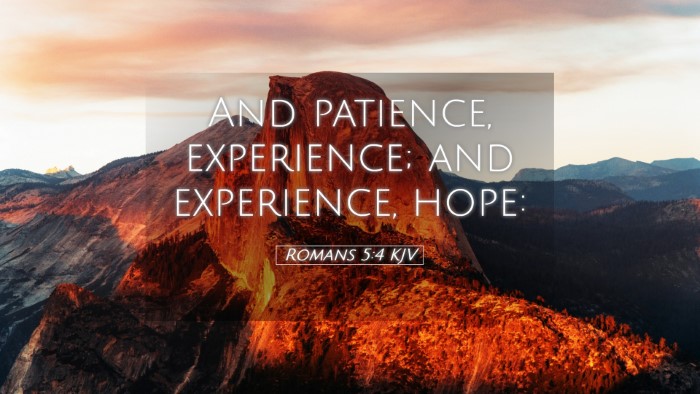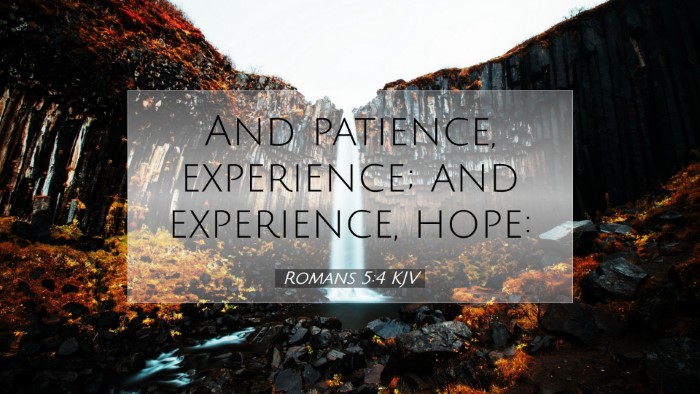Old Testament
Genesis Exodus Leviticus Numbers Deuteronomy Joshua Judges Ruth 1 Samuel 2 Samuel 1 Kings 2 Kings 1 Chronicles 2 Chronicles Ezra Nehemiah Esther Job Psalms Proverbs Ecclesiastes Song of Solomon Isaiah Jeremiah Lamentations Ezekiel Daniel Hosea Joel Amos Obadiah Jonah Micah Nahum Habakkuk Zephaniah Haggai Zechariah MalachiRomans 5:4
Romans 5:4 KJV
And patience, experience; and experience, hope:
Romans 5:4 Bible Commentary
Commentary on Romans 5:4
Verse: "And patience, experience; and experience, hope."
Introduction
This verse forms part of the Apostle Paul's exposition on the benefits of suffering within the broad context of Christian faith. In this succinct phrase, Paul articulates the process through which tribulation leads to patience, and how both patience and experience culminate in hope. The insights derived from various public domain commentaries shed light on the theological and practical implications of this profound statement.
Exegesis and Insights
1. Patience as a Necessary Virtue
Matthew Henry emphasizes that patience is not merely the ability to endure trials but a divine gift that enables believers to withstand hardships with hope. He suggests that this virtue develops a deeper character in followers of Christ, leading them closer to God's purposes. Adam Clarke adds that this patience should not be confused with passivity; rather, it is an active engagement in enduring trials with a heart set on God's promises.
2. The Role of Experience
Albert Barnes views “experience” as a result of patience under trial. It refers to the knowledge and wisdom gained through enduring life's sufferings. This term is derived from the Greek word dokimē, which conveys the idea of being tested and found approved. As believers experience God's faithfulness through trials, they grow in understanding and trust in His character. The experiential knowledge validates their faith and strengthens their spiritual resolve.
3. Hope as the Ultimate Goal
Hope, according to Henry, is a confident expectation rooted in the promises of God. It acts as a sustaining force during difficult times. Clarke notes that such hope is not a mere wish but a firm assurance, bred from experience and the power of the Holy Spirit. This hope empowers believers to face adversity with an unwavering trust in God's providence and ultimate deliverance.
4. The Interconnectedness of the Concepts
It is essential to recognize how these concepts are intertwined. As one faces tribulations, the development of patience leads to the gaining of experience, which subsequently fosters hope. This process is cyclical, reinforcing the reality that suffering is integral to the Christian journey. It transforms trials into a pathway for spiritual growth.
5. Theological Implications
This verse encapsulates a fundamental aspect of Christian theology regarding sanctification. The journey from tribulation to hope is a testament to God's redemptive work in believers. The insights of Barnes suggest that trials serve a purpose; they are not random occurrences but are tailored experiences designed by God to mold His people into the image of Christ.
6. Practical Application
The practical implications of Romans 5:4 extend to pastoral care and personal discipleship. Pastors and teachers can use this progression to counsel believers during times of suffering. Encouraging congregants to view trials through the lens of patience leads them to greater spiritual maturity. It is essential to remind them that their struggles will yield fruit, leading them eventually to a profound hope that anchors their souls.
- Pursue Patience: Encourage believers to actively cultivate patience through prayer and scripture engagement.
- Learn from Experience: Promote reflection on past experiences to identify God's faithfulness during trials.
- Focus on Hope: Equip believers to maintain a forward-looking perspective, reinforcing that hope in Christ is steadfast and rewarding.
Conclusion
Romans 5:4 succinctly captures the transformative power of tribulation, patience, experience, and hope in the believer's life. Drawing from the rich insights of Matthew Henry, Albert Barnes, and Adam Clarke, it becomes clear that suffering is not senseless but serves to cultivate a faith that is robust and deeply anchored in the assurance of God's future promises. This process is of utmost importance for pastors, students, theologians, and scholars as they engage with the realities of a broken world while trusting in the hope that is found in Christ.


